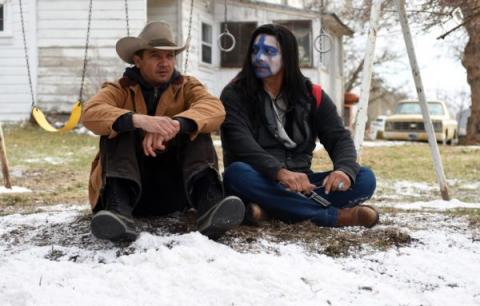At the end of Wind River, the major-film directorial debut of Taylor Sheridan, we are informed that no records are kept of how many Native American women go missing each year. It is an odd political note on which to conclude. Because while Wind River revolves around the disappearance and death of a young Native American woman, she is largely missing from the film herself, appearing alive only in one brief flashback.
Instead, the film is concerned principally with the fates of the fathers of such young women, two of whom appear in the film as principal characters. Which raises the questions: Is Wind River a story about the unacknowledged trials of Native American women? A sincere exploration of male grief? Or simply a vengeance movie that leverages the deaths of young women to up its emotional kick? I don’t doubt that Sheridan aspired to some combination of the first two; I fear that what he wound up with was closer to the final one.
Jeremy Renner plays Cory Lambert, a U.S. Fish and Wildlife Service agent tasked with patrolling the snowy wildernesses of Wyoming in winter. While out hunting for a predatory mountain lion, he instead comes across the body of a young woman (Kelsey Asbille) frozen in the snow. She had been sexually assaulted before fleeing barefoot into the night, until her lungs literally burst from gulping the subzero air. Her name is Natalie, and she was the daughter of Martin (Gil Birmingham), a close friend of Cory’s.
Cory, too, lost a daughter to the unforgiving elements years earlier. He and his Native American wife (Julia Jones), since divorced, had gone out of town; an impromptu party thrown by their daughter got out of hand; and she, too, died alone in the snow under hazy circumstances. His stake now in discovering what happened to Natalie is personal and palpable, if perhaps a touch overdetermined.
Because the death took place on the Wind River Indian Reservation, jurisdictional questions abound. Ultimately, the investigation falls to a tribal policeman named Ben (the always wry and wonderful Graham Greene); an ill-equipped—literally, she’s just been flown in from Vegas without even a winter coat—FBI agent, Jane Banner (Elizabeth Olsen); and Cory, whose cold-weather hunting and tracking skills prove to be precisely what the case requires.
The mystery itself turns out not to be much of a mystery, and its abrupt solution, offered in flashback, is odd and disappointing. But from the start, it is apparent that writer-director Sheridan is more interested in the mood of his film than in the details of its plot. His two previous screenplays, for Sicario and Hell or High Water—both excellent—were set in the wilds of Texas. Here he opts for the still more desolate snowscapes of Wyoming. (The Coen brothers did something similar when, having set their first two films in the arid flats of the Southwest, they moved their sixth, Fargo, to frosty Minnesota.)
With the aid of the cinematographer Ben Richardson (Beasts of the Southern Wild), Sheridan makes the landscape itself—snowswept, dotted with trees and outcroppings of rock, carved up by the treads of snowmobiles—a character as vivid as the human ones: austere, secretive, and ominous. (As Cory explains at one point: “Luck don’t live out here. Luck lives in the cities.”) It is no accident that, whatever roles human agency played in the deaths of Natalie and Cory’s daughter, the actual killer was in both instances the frigid land itself.
Sheridan’s dialogue is once again sharp and understated, and he shows an aptitude with his cast. All deliver strong performances, in particular Olsen and Birmingham, the latter of whom also had a major role in Hell or High Water. (Sheridan is an actor himself, best known for his role on Sons of Anarchy.)
For all its strengths, Wind River stumbles in its final act, as it struggles to balance its themes of solemn grief, macho retribution, and gender and cultural enlightenment. But it is still a film worth seeing—as, one hopes, will be whatever films lie in Sheridan’s promising future.
"Wind River" is screening now in theaters across the country.
[Christopher Orr is a senior editor and the principal film critic at The Atlantic. He has written on movies for the New Republic, LA Weekly, Salon, and The New York Sun, and has worked as an editor for numerous publications.]


Spread the word